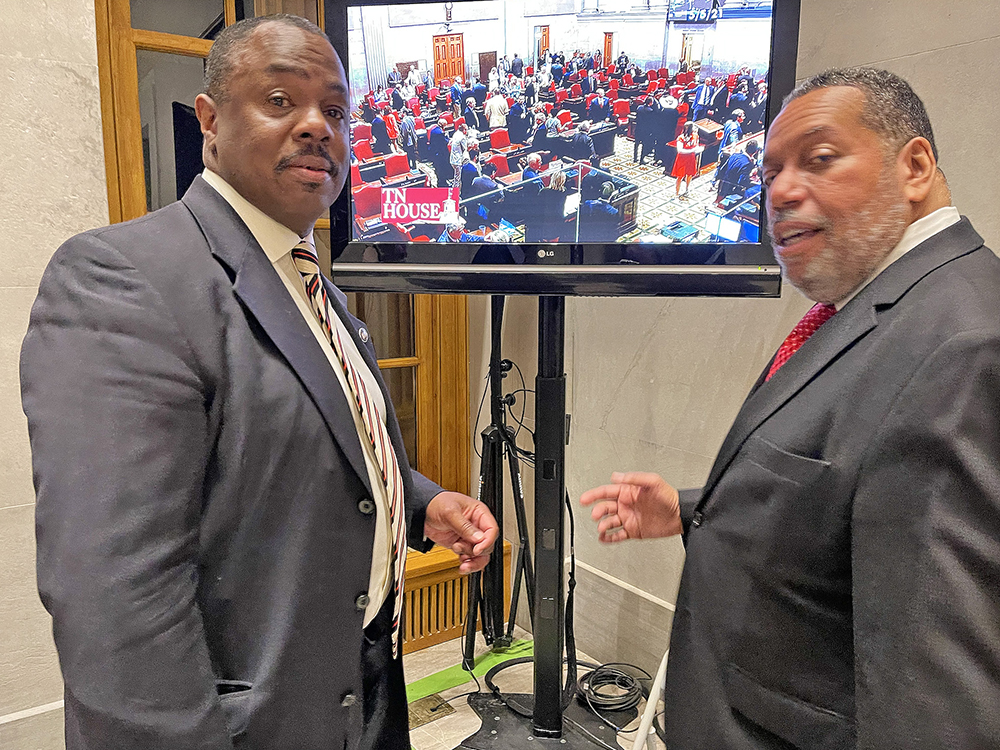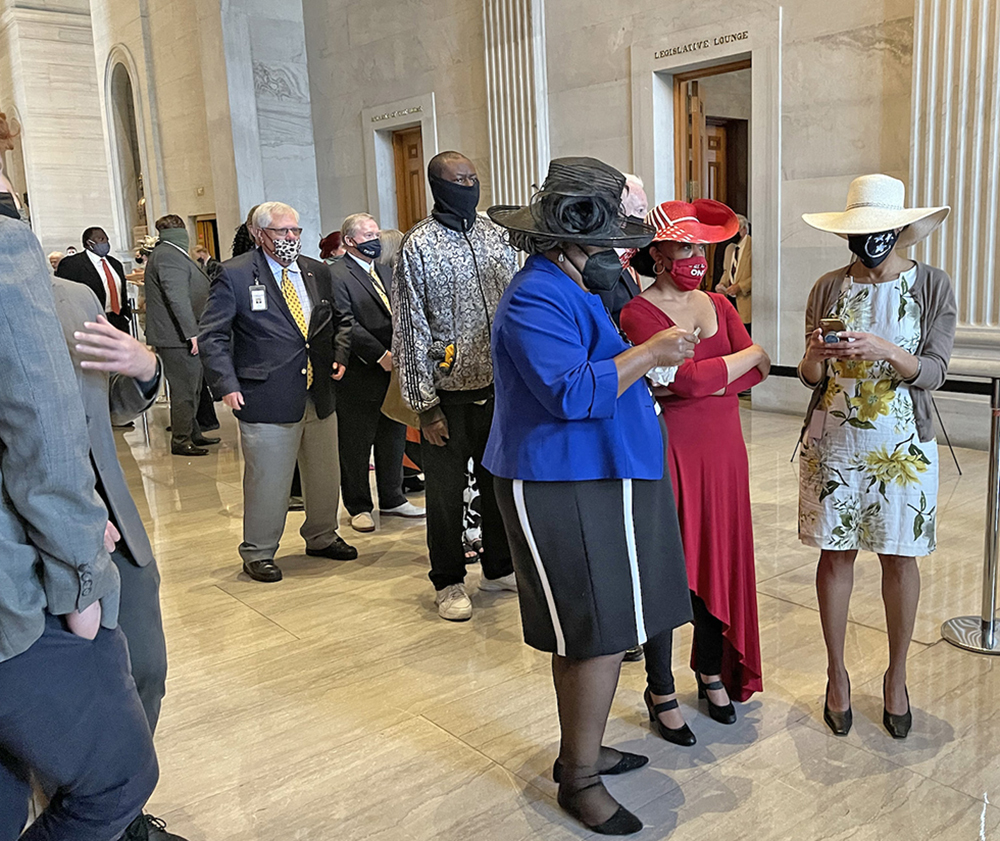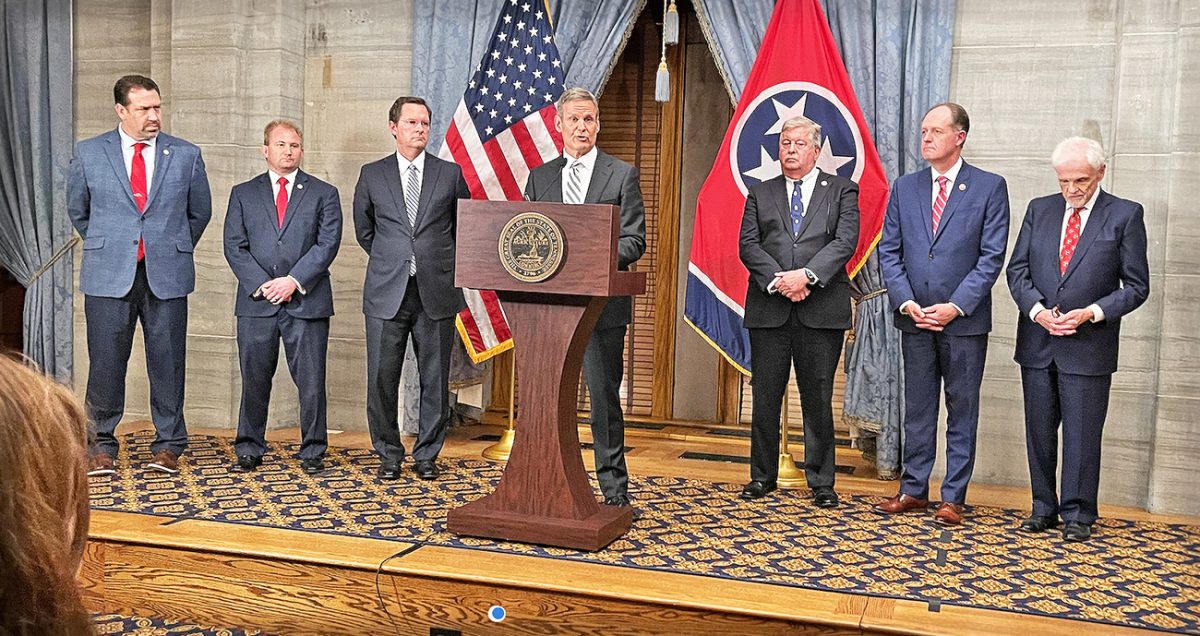Finally, well into the evening of Wednesday, May 5th, the first year’s session of the 112th Tennessee General Assembly came to an end, just slightly behind schedule. The leaders of elected state government stood in a row, as is the custom, on a low platform in the Capitol’s Old Supreme Court Room to face the truncated remainder of what, in previous years, had been a highly inquisitive and boisterous press corps.
Governor Bill Lee played host, speaking in his mellow, vaguely twangy Middle Tennessee tones and claiming success for the session in a general sort of way. The other leaders reciprocated in like regard, praising the governor and indulging in mutual compliments of each other. The chorus included Senate Speaker/Lieutenant Governor Randy McNally of Oak Ridge, House Speaker Cameron Sexton of Crossville, Senate Majority Leader Jack Johnson of Franklin, House Majority Leader William Lamberth of Portland, Senate Republican Caucus chair Ken Yager of Kingston, and House GOP Caucus chair Jeremy Faison of Cosby. White men all, they were something of a cross-section of the Assembly’s current Republican governing super-majority.
Governor Lee then solicited questions from the assembled media members, calling them by their first names. They politely responded with a series of process questions — all within the framework of subject matters alluded to by the legislators, their queries dodging matters of ideology and lacking any measure of tendentiousness or satirical spite that these reporters, like all reporters everywhere, express in jocular discussions amongst themselves.
Toward the end of the discussion period, Lee was asked if he had a reaction to the significant changes that had occurred in a controversial bill, the brainchild of veteran Senator Mike Bell of rural Riceville, who had set out to create a new statewide chancery court to hear all challenges to the constitutionality of state-government actions. Bell, the chairman of Senate Judiciary, was, as he put it, “head on” about his intent — to scuttle the existing precedent of routing all such cases through chancery in Nashville’s Davidson, the state capital and, all things considered, the last remaining citadel of the old Solid Democratic South.

“I’m admitting there’s partisanship within the judiciary; other people want to turn a blind eye to that. These judges are reflecting a philosophy now, and that’s of the people that are electing them,” Bell declared.
Several rulings emanating from Nashville chancery had riled him — most recently that of election year 2020 by Chancellor Ellen Hobbs Lyle, a Democrat, who broadened the right of Tennessee voters to cast mail-in ballots while the pandemic raged.
Bell’s bill, as originally written, would have established a new Chancery Court consisting of three judges, each representing one of the state’s Grand Divisions but all elected statewide. Thereby, argued Bell, legal judgments affecting state authority and regulations would reflect the majority of the state’s voters — i.e., would be guaranteed Republican-friendly.
The specter of so blatant an imposition of political will on the judiciary begat a flurry of activity to counter it — some out of the public eye, some of it openly, as in a high-pressure petition campaign by several Tennessee Democrats to defeat the “Gov. Lee Judicial Power Grab” — so called, apparently, because the state’s Republican governor would have dibs on appointing the first three judges prior to elections in 2022.
Quieter — and, importantly, more bipartisan — were efforts behind the scenes to reason with officials in and out of the legislature, including, notably, members of the governor’s staff. By the time the bill came to pass, on the last day, it created no new court — elected, appointed, or otherwise — and merely sanctioned the state Supreme Court to convene ad hoc tribunals made up of existing chancellors from throughout the state to hear cases involving state authority.

During the post-session press conference, Lee was asked his opinion of the significant changes made in the Chancery Court bill. With apparent sincerity, and with a convincingly uninvolved look, the purported power-grabbing chief executive answered that he didn’t know what those changes were, inasmuch as they had happened “during the last couple of hours.”
Also reduced to insignificance during the Assembly’s last hours had been a bill by Shelby County Senator Brian Kelsey that, in its original form, would have prohibited local governments from filing actions against state government and given the state an automatic stay, pending the resolution of its appeals, of any injunction against it.
After numerous postponements and adjustments, all that was left of Kelsey’s bill on the last day was a provision allowing the state a somewhat more expedited way to appeal adverse judgments against it. The bill passed the GOP-dominated Senate by the unimpressive margin of 17 to 10.
In the case of both these bills, collective reason had prevailed, probably because there were enough legislators with legal backgrounds or with prior service in local governments to recognize wolves in sheep’s clothing.
There is another point worth making about the outcome of these two judicial measures: The term “Nashville” is often used, especially on this end of the state, as a term of reproach, as a synecdoche of sorts for the legislature’s more obstinate or backward-looking actions. But in fact, as in the case of the chancery court bill, Nashville more often than not comes in for the same sort of punishment as the state’s other major urban center, Memphis, and Davidson County legislators are fairly dependably shoulder-to-shoulder with Shelby Countians in opposing bills with an ultra-conservative tilt.
It is often tempting to regard what the legislature does as a clown show, and there is no doubting that it sometimes comes off that way. State Representative Frank Niceley, a Republican from Strawberry Plains in east Tennessee, seems especially determined to play into that stereotype. His arsenal of remarks, ranging from the comical to the folksy to the outlandish, is a familiar staple of the legislative dialogue, as when, apropos of nothing in particular, he trotted out last week a version of that old saw in which an equivocating politician of yore both endorses alcohol as the elixir of life and condemns it as demon rum.
More unfortunate was this doozy, supportive of a Niceley measure to guarantee Tennesseans the right not to be vaccinated against COVID-19: “I think if you’ve got your weight right, and your lifestyle right, and your diet right … I don’t think this virus will bother you.”
Yet Niceley can be a source of plain common sense as well, as when, during a debate on legalization of medical marijuana in Tennessee, he vented a concern that the state was allowing the possibilities of a highly profitable cash crop to go untapped.
The legislature cranked itself up in the last week to allow a somewhat adulterated variant of THC to be imported from outside Tennessee in limited quantities for limited medicinal purposes, and Niceley’s lament struck many as making all the sense in the world.
With some exceptions, the bills that were dealt with in the Assembly’s closing chapter this year were those for which sentiment was mixed. Much of the more drastic legislation was passed early on.
One example was HB 3/SB 228, a trans-phobic measure co-sponsored by Rep. Scott Cepicky (R-Culleoka), an ex-athlete, and Sen. Joey Hensley (R-Hohenwald), a physician, mandating that a student’s participation in sports had to conform to the gender indicated on his/her birth certificate. The bill was signed by Lee and became law in early April.
Another case was that of the notorious SB 1121/HB 828, co-sponsored by Rep. Tim Rudd (R-Murfreesboro) and Sen. Janice Bowling (R-Tullahoma), basically requiring women seeking abortions to bury or cremate their fetal remains or pay a stiff fine to support a variety of state funds. This one, too, is now state law, signed by Lee.
But most far-reaching of all was HB 786/SB 765, co-sponsored by House Majority Leader William Lamberth (R-Portland) and Senate Majority Leader Jack Johnson (R-Franklin). Dreaded (by law enforcement) and coveted (by the NRA and other gun groups) for years, the bill, now signed into law by Lee (and a pet project of his), allows open permitless carry of firearms.
What’s done is done, and only posterity will be able to fully gauge the consequences of these measures, which are no laughing matter.
Much of the last day of the session consisted of back-and-forths on matters of controversy. There was, for example, a protracted struggle between the House and the Senate on whether SB 623/HB 580, a caption bill regarding certain state mandates for the public schools, should contain an amendment from conservative House member John Ragan (R-Oak Ridge) making it illegal to teach any of a series of ideas currently being widely debated — e.g., whether America is a racist society or has historically fostered depredations by whites against citizens of color. The Senate refused at first to pass Ragan’s amendment to that end, characterized by opponents as a “Don’t-blame-white-people-for-the-race-problem” clause.
But Ragan essentially got what he wanted from a conference committee consisting of members from each chamber. As articulated by the aforesaid Kelsey in the resultant committee draft, “‘Critical race theory’ holds that the rule of law does not exist but instead is a struggle of power relationships between races and groups.” Hence, such a theory, along with what Kelsey condemned as a corollary notion, that American history began not in 1776 but with the importation of slaves to the continent in 1619, would be taboo in Tennessee schools.
Not every difference of opinion was resolved by an act of senatorial backtracking, however. SB 843/HB 513 — a measure sponsored by two West Tennesseans in the shadow of Memphis, Senator Paul Rose (R-Covington) and Representative Ron Gant (R-Rossville) undertook to declare it a felony to “obstruct a highway” and would have created “the offense of throwing an object at another while participating in a riot,” as well as “the offense of intimidating or harassing another while participating in a riot.” Meanwhile, it would arguably have exculpated motorists from striking such a rioter — inadvertently, of course. Styled the “Law and Order Act of 2021,” the bill steamrollered through the House, 70-23, but was blocked in the Senate’s Judiciary Committee, where it was relegated to “summer study,” a.k.a. limbo.
On an issue whose topicality was certified nationally on this past Sunday morning’s political talk shows, Representative Nathan Vaughan (R-Collierville) got to retreat somewhat from his reputation as a Republican moderate, as he and his GOP colleagues churned out epithets like “mailbox checks” and “giveaway money” to distinguish unemployment stipends from money earned on the job, as he argued that the state’s unemployment compensation fund was in ultimate danger of depletion, at a time, he said, when easy unemployment money was militating against employers’ needs for an available labor force.
Democratic Rep. Gloria Johnson (D-Knoxville) took issue with the idea that the state’s laid-off workers were “lazy or living large,” but with impressive solidarity and party-line margins, both the House and the Senate saw things Vaughan’s way, approving HB 10230/SB 1402, which reduced the period of eligibility for unemployment benefits from 26 weeks to a range of between 12 and 20 weeks, while boosting weekly unemployment stipends by minimal amounts. The House passed the bill 71-19, the Senate by 26-7. Not much argument there on a matter that, in similar form, was undergoing discussion in a dozen other states.
Mention should be made here of a resolution successfully accomplished during the last week, one that voters of Tennessee will have an opportunity to concur with in the next statewide general election in November 2022. This was Senate Joint Resolution 80, sponsored in the Senate by Raumesh Akbari and in the House by Joe Towns, both of Memphis. What it will do, if passed on the 2022 ballot as a constitutional amendment, is nothing less than the abolition of slavery.
To be sure, slavery is already abolished in Tennessee and in its constitution, and has been since the state’s ratification in 1865 of the 13th amendment to the Constitution of the United States. But the state constitution, like the national one, reflects an exception — banning slavery or involuntary servitude “except as a punishment for crime whereof the party shall have been duly convicted.” SJR 80, which contains language expressly granting the right of the state to require work on inmates, would banish that exception.
It is a fine point, perhaps, but one that has passed legal muster, though the resolution received a handful of no votes in both the Senate and the House, based on a foreboding, as Rep. Susan Lynn (R-Mt. Juliet) expressed it, that prisoners might henceforth have a right to sue for relief under the revised amendment.
The great majority of legislators in both chambers and both parties seemed untroubled, and the sponsors were certainly pleased — Towns to the point that he pronounced himself ready to launch a national campaign to expunge the criminal-punishment exception from the 13th amendment.
A mite giddy, perhaps, but who can begrudge him? It isn’t every year that the Tennessee legislature manages to improve on Lincoln the Emancipator.
